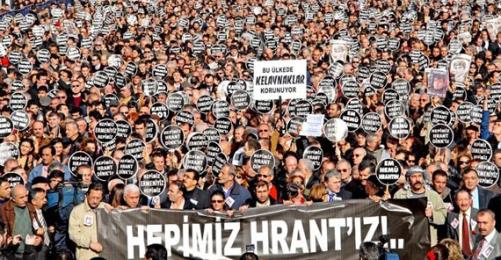HRANT DINK TRIAL
State Concedes "Severe Mistake"

Upon the request of President Abdullah Gül, the State Supervisory Council (DDK) conducted a probe into the assassination of Turkish-Armenian journalist Hrant Dink, then editor-in-chief of the Armenian Agos newspaper. The DDK reached the conclusion that "a severe failure occurred within the public service to protect Dink's right to life".
Dink, founder of the Agos newspaper, was shot in front of his office in Şişli (Istanbul) in the middle of the day on 19 January 2007.
On Monday (20 February), it was announced on the website of the Prime Ministry that President Gül ordered a probe of the DDK last year after public pressure had increased regarding an effective trial and further connections of the arrested perpetrators.
On 28 January 2011, the DDK launched an investigation which was completed now.
The 653-page report was published in a summarized version of 34 pages. A section of the report could not be disclosed due to the "confidentiality of the investigation". Parts of the summarized versions were blackened.
"The public service severely failed"
The DDK report revealed that that both the police and the gendarmerie were informed about the threat against Hrant Dink and that intelligence units failed to take necessary measures to protect the journalist.
Related units did not co-operate, the DDK claimed. Moreover, despite being aware of the risk, the administrative authorities failed to take necessary precautions to prevent danger that occurred as the result of chain actions of responsible people on every level.
It is stated in the report that by reason of these failures "the danger came true" and "Hrant Dink was killed".
The DDK determined that the investigations carried out about the state officials who committed these severe mistakes in public service did not reach an effective result because of the related legislation, errors/inaccuracies in the followed methods and due to other insufficiencies.
"Improper investigation from the beginning"
The report specified the following findings:
- Decisions regarding the permission for investigations about personnel of the Provincial Police Directorates in Trabzon and Istanbul and also about staff members of the General Police Directorate Intelligence Branch Presidency were finalized without the result of the administrative judicial review and/or appeals. Hence, no judicial prosecution was opened about these public officials.
- The investigation about the personnel of the Trabzon Gendarmerie Command was partly brought to court and some staff members were convicted of neglect of duty.
- Permission for an investigation into the involvement of personnel of the National Intelligence Agency (MIT) was given but the Public Chief Prosecution decided to drop procedures due to the statute of limitation.
- The murder suspect and the instigators of the murder were convicted.
- Investigation launched by the prosecutor's office about some public officials after the decision of the European Court of Human Rights (ECHR) were continued as well as a probe about possible other perpetrators and instigators behind the murder.
It was emphasized in the report that the administrative inquiry and investigations about public officials after the murder was not done thoroughly.
"The investigation of such an incident and the evidencing remained insufficient in terms of available tools and concerning the capacity of the investigation with regard to the legislation. Additionally, the present situation is not satisfying due to the factors as mentioned above. A 'basic mistake' was being made from the very beginning with respect to how the investigation should be carried out and within which scope", it was said in the report.
The report furthermore underlined that according to DDK's evaluation, the investigation and prosecution of the mentioned public officials was obligatory in the scope of the main trial.
ECHR decision
On 14 September 2010, the ECHR announced its decision on the case Dink vs. Turkey.
The ECHR unanimously decreed for violations of Article 2 of the European Convention on Human Rights on the "right to life", "freedom of expression" enshrined in Article 10 and "the right to an effective remedy" according to Article 13 of the convention.
The ECHR indicated that the Trabzon Governorship had not issued permission for the prosecution of more than two gendarmerie officers:
"A judicial decision was not reached regarding the question why the higher-grade officials, who held the authority of preventing the murder, remained passive even though the non-commissioned officers had forwarded relevant information. This shows obvious negligence of the responsibility to take precautions when evidence of the incident had been provided".
The State Supervisory Council
According to Article 108 of the Constitution, "The State Supervisory Council which shall be attached to the Office of the Presidency of the Republic with the purpose of performing and furthering the regular and efficient functioning of the administration and its observance of law, will be empowered to conduct upon the request of the President of the Republic all inquiries, investigations and inspections of all public bodies and organisations (...)".
As stipulated in Article 138 of the Constitution, "no organ, authority, office or individual may give orders or instructions to courts or judges relating to the exercise of judicial power, send them circulars, or make recommendations or suggestions". Thus, the DDK is not entitled to give any orders, instructions, advice or recommendation. (IC/VK)







